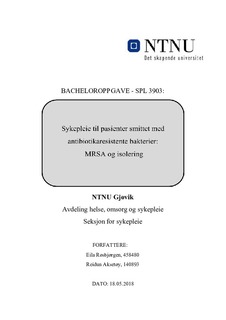| dc.contributor.advisor | Vifladt, Anne | |
| dc.contributor.author | Røsbjørgen, Eila | |
| dc.contributor.author | Aksetøy, Reidun | |
| dc.date.accessioned | 2018-08-28T08:08:59Z | |
| dc.date.available | 2018-08-28T08:08:59Z | |
| dc.date.issued | 2018 | |
| dc.identifier.uri | http://hdl.handle.net/11250/2559523 | |
| dc.description.abstract | Bakgrunn: Antibiotikaresistens er i følge Verdens Helseorganisasjon en av de største helsetruslene vi står overfor. Forekomsten av MRSA i Norge er relativt liten, men sprer seg i økende grad i både primærhelsetjenesten og spesialisthelsetjenesten. Isolering som smitteverntiltak vil være nødvendig ved kontakt med helsetjenesten for å hindre smittespredning. Isolering kan oppleves som vanskelig for pasienten og gi negative konsekvenser psykososialt. Hensikt: Hensikten med denne litteraturstudien er å belyse utfordringer som påvirker isolerte MRSA-smittede pasienter og hvordan sykepleiere kan bidra til å vareta pasientens psykososiale helse. Metode: Litteraturstudie med strukturerte søk i databasene Cinahl, PubMed og SweMed+. Det er i tillegg gjort manuelle søk. 6 artikler av kvalitativ og kvantitativ metode er inkludert. Resultat: Funnene fra de 6 artiklene viser at sykepleiere må være bevisst på at MRSA ervervelse og isolasjon kan oppleves som en livskrise for pasienten. Funnene er kategorisert i tre temaer: psykososiale utfordringer , kompetansens betydning og relasjonens betydning. Konklusjon: Ved å skape gode relasjoner til pasienten og tilegne seg og videreformidle kunnskap om MRSA og smitteforebygging, kan sykepleiere bidra til å ivareta pasientens psykososiale helse. | nb_NO |
| dc.description.abstract | Background: According to the World Health Organization, Antibiotic Resistance is one of the biggest health threats to mankind. The prevalence of MRSA in Norway is relatively small, but increasingly spreading in both the primary and specialist health services. Insulation as a contraceptive measure will be necessary upon contact with the health service to prevent spread of infection. Isolation may be experienced as difficult for the patient and give negative effects psychosocially. Aim: To elucidate challenges affecting isolated MRSA-infected patients and how nurses can help maintain the patient's psychosocial health. Method: Literature study with structured searches in the databases Cinahl, PubMed and SweMed +. In addition, manual searches have been made. 6 articles of qualitative and quantitative method are included. Results: The findings from the 6 articles show that nurses must be aware that MRSA acquisition and isolation can be perceived as a life crisis for the patient. The findings are categorized into three themes: psychosocial challenges , the importance of competence and the importance of the relationship. Conclusion: By creating good relationships with the patient and acquiring and disseminating knowledge about MRSA and infection prevention, nurses can help to protect the patient's psychosocial health. | nb_NO |
| dc.language.iso | nob | nb_NO |
| dc.subject | sykepleie | nb_NO |
| dc.subject | antibiotikaresistente bakterier | nb_NO |
| dc.subject | MRSA | nb_NO |
| dc.subject | isolering | nb_NO |
| dc.title | Sykepleie til pasienter smittet med antibiotikaresistente bakterier: MRSA og isolering | nb_NO |
| dc.title.alternative | Nursing patients infected with antibiotic-resistant bacteria: MRSA and isolation | nb_NO |
| dc.type | Bachelor thesis | nb_NO |
| dc.subject.nsi | VDP::Medical disciplines: 700::Health sciences: 800::Nursing science: 808 | nb_NO |
| dc.source.pagenumber | 44 | nb_NO |
